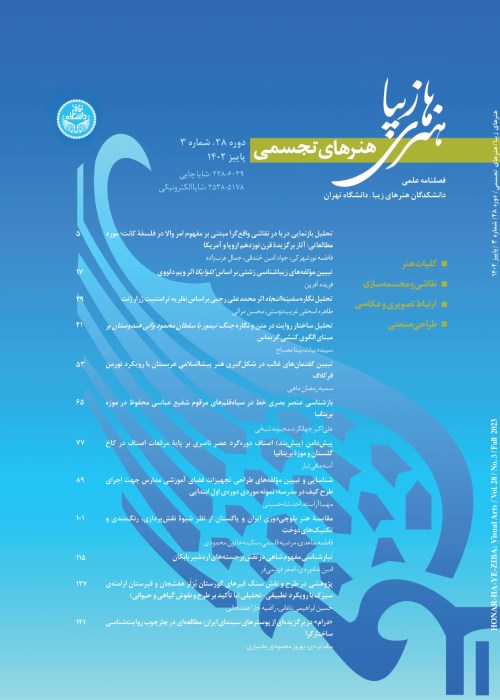Role of Imagination in the Phenomenology of Aesthetic Experience on Mikel Dufrenne Case Study: Paintings of Charles VIII
Author(s):
Abstract:
Mikel Dufrenne is one of the most important figures in phenomenology of art. His voluminous book named phenomenology of aesthetic experience has created a fundamental development in aesthetics، which continued and formed the book called about poetry. This book is one of the most considerable events in modern history of philosophy، and also the second complete French work as «phenomenology»، and only in this case Merleau-Ponty''s phenomenology of perception takes precedence. Dufrenne undoubtedly has been fully informed about works of different philosophers such as: Moritz Geiger and his emphasis on the experience of aesthetic pleasure in phenomenological psychology، Roman Ingarden and his emphasis on the role of art in shaping the actions of intentionality is sufficient; and has completely read Sartre and Merleau-Ponty''s works. Also، in their essays covers a lot of ground and draws into his discussion on aesthetics a whole range of thinkers، including Barthes، Foucault، Lyotard، Metz، Freud and Derrida …. These essays are well worth reading both for the quality of the writing and for the continual insights which come to the surface along the way. From the very beginning he clearly does not follow the exact footsteps of Husserl، but he wants to understand phenomenology as Sartre and Merleau-Ponty used this French term. Aesthetic perception is one of the controversial discussions on the new aesthetics that Dufrenne has tried to express it from a special point of view. In his idea، artwork provides a structure for an aesthetic object which is the most important distinction between these two in perception. In this paper، we try to determine this differentiation and show the process of aesthetic perception and role of imagination from Dufrenne’s point of view. Dufrenne distinguishes three stages in aesthetic perception. The first stage is presence which he is influenced by Merleau-Ponty at this stage. The second stage is imagination which he is influenced by Sartre and the third stage is perception and feeling influenced by Kant. In Dufrenne’s idea in understanding the art work، the spectator of art work should understand these three aspects simultaneously. Therefore، in this quest we try to examine the second stage by descriptive and analytical method and also propound the impact that Dufrenne got from Sartre. Library research and writing studies and theoretical study of internal and external sources، we have analyzed the views Dufrenne. A qualitative approach to data analysis is based on a phenomenological approach. Also، the influence of Sartre Dufrenne been mentioned. Finally، Dufrenne concluded that imagination is a process of perception and protests Sartre for neglecting understanding because of the mind and emotions and considers this negligence the reason of Sartre’s misinterpretation of aesthetic experience. Emphasis on aesthetic perception، Merleau-Ponty Dufrenne closer to the generally accepted position. He tries to talk about the perception of the nature of aesthetic experience to explain and discuss the position of Sartre and Merleau-Ponty on the Judiciary emphasizes the fact that the perception will be driven approach. However، the discussion of the object and its relationship with Merleau-Ponty perception is also controversial.
Keywords:
Language:
Persian
Published:
Journal of Fine Arts, Volume:19 Issue: 4, 2015
Pages:
5 to 14
magiran.com/p1457787
دانلود و مطالعه متن این مقاله با یکی از روشهای زیر امکان پذیر است:
اشتراک شخصی
با عضویت و پرداخت آنلاین حق اشتراک یکساله به مبلغ 1,390,000ريال میتوانید 70 عنوان مطلب دانلود کنید!
اشتراک سازمانی
به کتابخانه دانشگاه یا محل کار خود پیشنهاد کنید تا اشتراک سازمانی این پایگاه را برای دسترسی نامحدود همه کاربران به متن مطالب تهیه نمایند!
توجه!
- حق عضویت دریافتی صرف حمایت از نشریات عضو و نگهداری، تکمیل و توسعه مگیران میشود.
- پرداخت حق اشتراک و دانلود مقالات اجازه بازنشر آن در سایر رسانههای چاپی و دیجیتال را به کاربر نمیدهد.
In order to view content subscription is required
Personal subscription
Subscribe magiran.com for 70 € euros via PayPal and download 70 articles during a year.
Organization subscription
Please contact us to subscribe your university or library for unlimited access!


